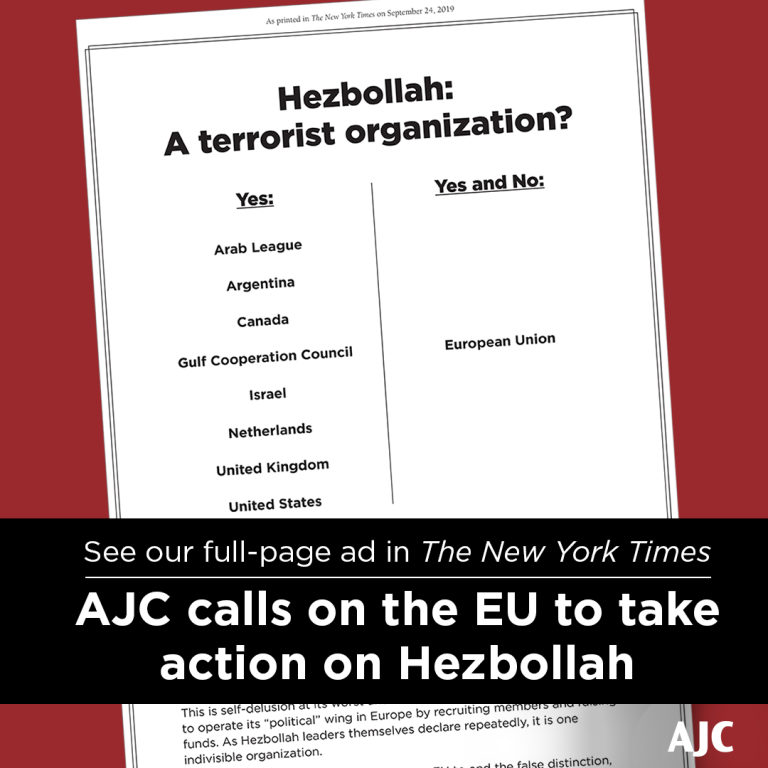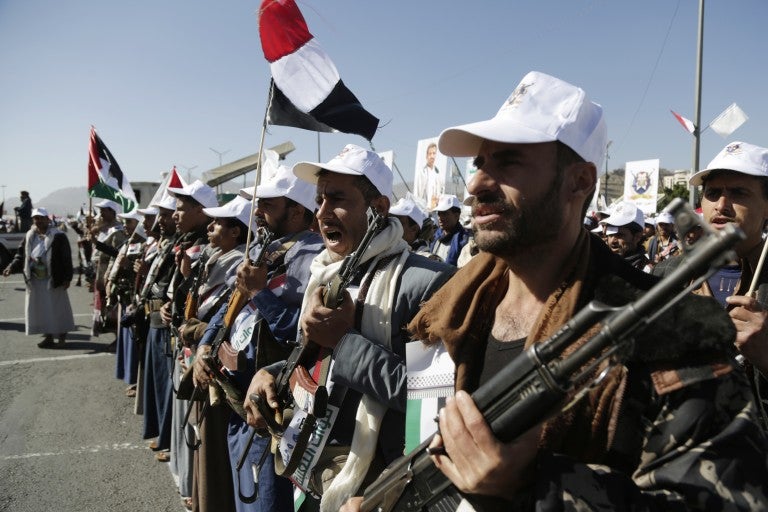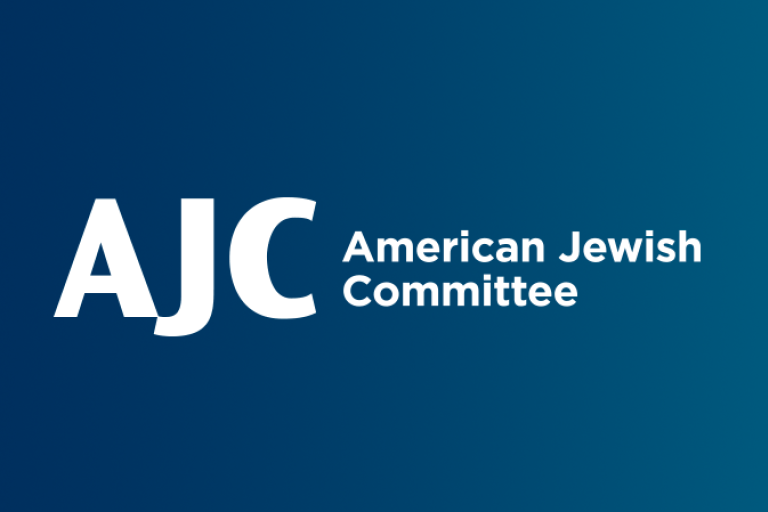“Groups that pose a terrorist threat in the Middle East don’t necessarily pose a threat to the EU. What happens in the Middle East, stays in the Middle East. The refugee crisis is water from a different stream.”
Short Response: Hezbollah has established a terrorist infrastructure in Europe and executes terrorist attacks against non-European targets on European soil.
The Facts: Events that take place in the Middle East have a global impact. Even in cases where terrorist organizations do not attack “host” countries directly, any action on European soil or aid for such action threatens the continent at large. In addition to a potential terrorist attack, extremists also put the cultural cohesion of European society at risk.
Terrorist threats to Europe posed by Hezbollah:
- Physical threat. Globalization and easy passage between countries has allowed terrorist organizations, including Hezbollah, to expand their scope of activity. Hezbollah carried out a terrorist attack on a tourist bus in Burgas, Bulgaria, and attempted attacks in Cyprus in 2012. In recent years, several apartments and hideouts have been discovered throughout Europe, storing huge quantities of explosives and chemical materials for the manufacture of powerful explosive devices. In 2015, a warehouse containing 8.3 tons of ammonium nitrate was found in Cyprus. Six months later, four hiding places were found in London containing three tons of the same material.
- Involvement in the arms trade. Hezbollah is involved in weapon trading operations on European soil. For example, in 2014, a Hezbollah arms dealer named Ali Fayad was arrested in the Czech Republic. Following the arrest, Hezbollah operatives in Lebanon kidnapped several Czech citizens who were freed in exchange for Fayad's release.
- Hezbollah's crime and financing network. Most of the organization's illicit financing activity comes from drug trade, trafficking illegal substances, theft, and money laundering. A drug network run by Ayman Juma smuggled cocaine from South America to West Africa, and from there to Europe and the Middle East. The value of the capital laundered through the Lebanese Canadian Bank was estimated at $200 million per month. As part of “Operation Cedar,” authorities discovered a second network in 2016 in which 16 members of the organization's criminal network in Europe – France, Belgium, Germany, and Italy – were arrested after laundering up to 1 million euros from international drug deals by buying and selling luxury goods worldwide. Hezbollah's criminal activity also extends to cyberspace. In October 2018, several servers in the Czech Republic were seized and shut down after Hezbollah used them to break into networks and computers around the world for extortion and data theft.
- Hezbollah exploits the freedom of movement of its operatives in Europe to commit crimes, raise funds, incite, and recruit new members. According to a German intelligence report from May 2019 on Hezbollah's threat to Germany, the number of Hezbollah operatives in the country rose from about 950 to about 1,05013. Over the past 20 years, the organization has used its presence in Germany to recruit Caucasian terrorist operatives. For example, in 1997, a German Hezbollah operative named Steven Smirk was arrested in Israel. He was trained in Lebanon before being sent on a suicide mission. Smirk converted to Islam in Germany and underwent religious radicalization by Hezbollah representatives in the country.
- The community of Lebanese exiles around the world is a regular source of income for the organization. With the help of mosques, Shi’ite cultural centers, and charities, Hezbollah turns to exiles for donations to the organization. Donations are recorded as assistance to the needy and to the organization's social activities in Lebanon. In practice Hezbollah’s social institutions in Lebanon support its military activities. For instance, the Jihād al-Binā' Foundation initiates social projects while serving as the engineering wing of the organization. In 2013, Germany outlawed two charities for orphans because they transferred donations to the Martyrs Foundation in Lebanon, which directly assists Hezbollah's military-terrorist activities.
- Incitement against its opponents, namely the United States and Israel, is another aspect of the organization's activities in Europe. Every year, the organization's Secretary-General himself calls on the organization’s operatives and supporters to participate in marches, such as the “Al Quds Day march,” around the world. This activity, along with incitement in mosques and in Shi'ite cultural centers throughout Europe, contributes to an increase in antisemitism throughout the continent. Josef Schuster, head of the German Central Council of Jews, said that the ‘Al Quds’ demonstrations “transport nothing but antisemitism and hatred of Israel.” In the past two months alone, four Shi’ite cultural institutions were shut down in France for incitement.
- The dawah threat. By providing support to the community in which they operate, Islamic terrorist organizations, including Hezbollah, use the organization's social network to strengthen their ideological and economic support. By recruiting clerics within immigrant communities and the Shi’ite population in various European cities, Hezbollah strengthens its ideological narrative and mobilizes supporters.
The refugee crisis and the threat to Europe:
In the age of globalization, events do not occur in a vacuum. Instability in several Middle Eastern countries has led to civil war, and to an unprecedented stream of refugees from failed states to European countries. In an age of open borders and freedom of movement, Europeans must cope with a range of threats, including foreign fighters returning to their countries of origin in Europe. In recent years, and especially since the rise of the Islamic State, the Middle East has served as a recruitment and radicalization center for European Muslims. Those who survived the fall of the so-called Caliphate are making their way back to Europe and have become a security threat to the continent.
Political crises and a weak central government, coupled with civil wars, are causing populations to flee Middle Eastern countries, longing for a better life in the West. Moreover, when an ethnic and sectarian crisis occurs, there is a clear interest in diluting the enemy population in order to create demographic changes in the country. For Hezbollah operatives in Europe, these refugees constitute a target for recruitment.
Over the years, several terrorist attacks and attempted strikes were carried out against non-European targets on European soil. When wars take place in the Middle East, efforts are made to attack the regime opponents in Europe. In 2018, twice Iranian intelligence tried and failed to carry out mass attacks against regime opponents– a plot to detonate an explosive device at a conference in France and an attempted assassination in Denmark. In addition, in 2015 and 2017, two opponents of the Iranian regime were assassinated in Holland. Hezbollah also imports terrorism from the Middle East, as demonstrated in the 1980s when it hijacked three planes and carried out several deadly attacks against shops and hotels in Paris. In the 1990s, the organization was accused of detonating two car bombs at the Israeli Embassy and a Jewish charity in London, and in 2012, the organization carried out an attack on a bus of Israeli tourists in Burgas, Bulgaria.
Download the Factsheet Here
13 https://www.verfassungsschutz.de/en/public-relations/publications/annual-reports/annual-report-2018-summary





